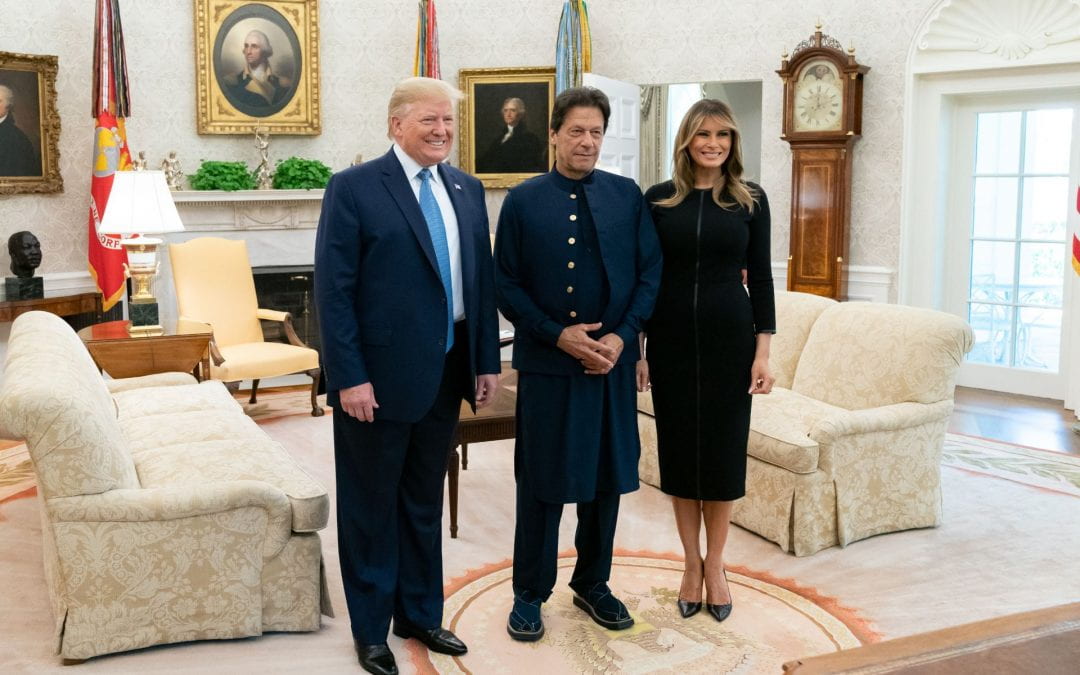By Parveen Akhtar
From the cricket pitch to politics, Pakistan’s next prime minister has played the long game, as Parveen Akhtar explains.
Being cavalier about death is a prerequisite in Pakistani politics. The country’s first prime minister, Liaquat Ali Khan, was assassinated – and a number of subsequent leaders have shared the same fate, variously being executed by order of the state, blown up on planes and at political rallies. In the aftermath of 9/11, Time magazine described governing Pakistan as one of the world’s toughest jobs. Nevertheless, the man elected to be the country’s next prime minster, Imran Khan, has spent more than two decades seeking the office. On death and politics, Khan is casual, indeed. “You’ve got to go sometime” is his response – and he’d rather go for a cause.
Born in Lahore in 1952, Khan was educated at the prestigious Aitchison College – a relic of Empire nestled in the pleasant green land of the Punjab – before going on to study PPE at Oxford. An Oxbridge education has, of course, begun the political career of many a world leader, including the founding father of Pakistan, Muhammad Ali Jinnah, and a number of successors.
Khan has played the part of leader before. He was captain of Pakistan’s cricket team when it won the World Cup in 1992. After cricketing success, he turned his hand to politics, founding his Party for Justice, Pakistan Tehreek-e-Insaf (PTI) in 1996. His political journey has been a long one. But his perseverance has now paid off – he will now take the helm of a country which he claims has been left on the brink of failure after years of corruption.
Dynasty breaker
Electoral choice has been scant in the Pakistan’s short history. In its 70 years, it has been ruled intermittently by political dynasties and the military. Khan is disparaging about this legacy: “Never has a country’s ruling elite, for personal benefit … betrayed their people as much as in Pakistan”. He billed himself as the “anti-status quo” candidate – anti-corruption, anti-nepotism.
Khan, of course, has many critics. Some argue that in his quest for political power he has made alliances with conservative hardliners, including the Taliban and others who see his victory as a triumph for Pakistan’s all-important military. On a more personal level, his second wife, to whom he was married for less than a year has written a tell-all book. Khan does not come out of it well at all. “I have never claimed to be an angel,” he said of his playboy past. It’s doubtful if an angel would make it Pakistani politics. But his first wife, the British heiress Jemima Goldsmith, the mother of his two sons – to whom he was married for nearly a decade – publicly congratulated Khan on his victory.
Khan served as the chancellor of Bradford University between 2005-2014, in the British city which has one of the highest concentrations of citizens of Pakistani ancestry. Described by Bradford’s vice chancellor as “a wonderful role model for our students”, Khan has been a hero for diaspora Pakistanis since his cricketing heyday in the 1980s. This was the decade which saw Pakistanis in Britain hit the headlines as a “problem community”. Controversial headteacher Ray Honeyford fuelled division with comments about the damaging affects of multiculturalism. Then, later, author Salman Rushdie was the subject of a fatwa for his book, The Satanic Verses. What became known as the “Rushdie Affair” led to Britain’s Pakistani community being commonly seen as a Muslim community unable and unwilling to integrate into British life.
In Pakistan, Khan first appealed to a small but loyal, educated middle class which saw in him the chance to change the perpetually negative narrative of their country. In 2011, broadcaster Andrew Marr described Pakistan as “overcrowded, nuclear armed, Taliban touched and in some senses paranoid” – hardly an endorsement for a holiday destination. And, yet, tourism is part of the vision Khan has for a new Pakistan.
Khan proclaims himself to be Pakistan’s only political leader to make their money outside Pakistan, while keeping it all in Pakistan. He sold his London flat to buy a jungle on the outskirts of Islamabad, with cows for milk and yoghurt, a vegetable patch and even his own wheat – a picture of idyllic self-sufficiency. Now he just has to recreate at least something of that vision for the country which he has been elected to govern.
This article was originally published on The Conversation and has been republished under a creative commons license. For the original, click here.
Parveen Akhtar is a Lecturer in Political Science at Aston Centre for Europe, Aston University.
Disclaimer: The ideas expressed in this article reflect the author’s views and not necessarily the views of The Big Q.

